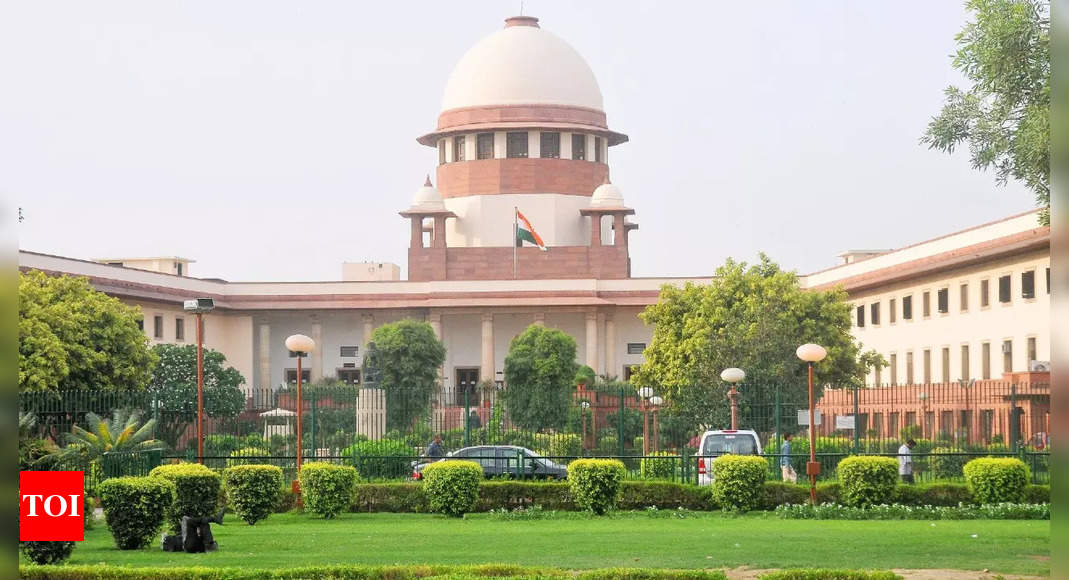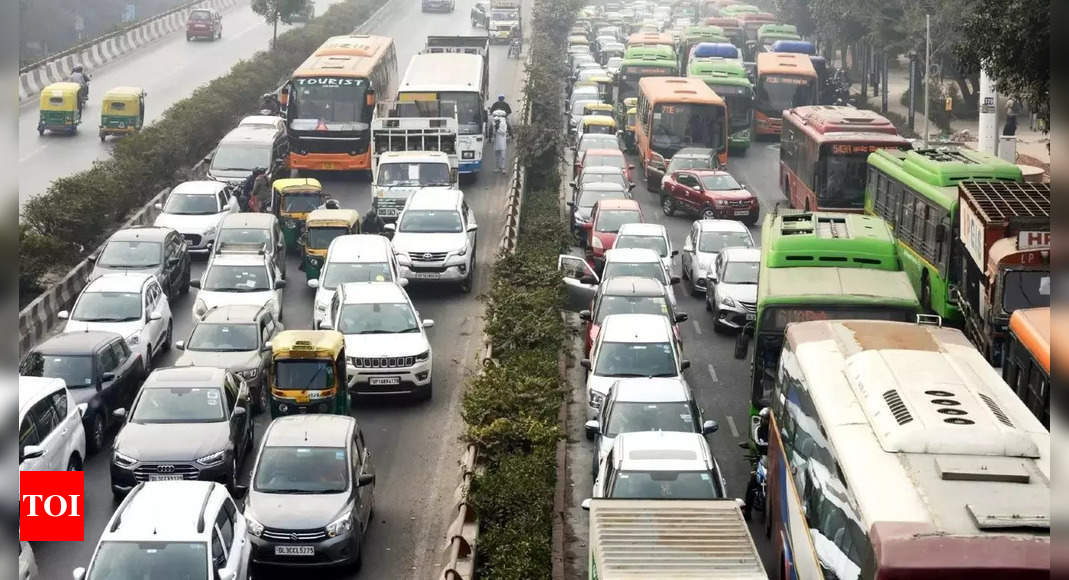[ad_1]
NEW DELHI: Observing that courts should not show leniency towards corrupt public servantsthe Supreme Court on Thursday ruled that direct evidence of demand and acceptance of bribe is not necessary to prove guilt under the Prevention of Corruption Act and a person can be convicted on the basis of circumstantial evidence.
A five-judge constitution bench held that a court can convict a corrupt official for demanding and accepting bribe even in a case in which witnesses, including the complainant, turn hostile and backtrack from their earlier statements that bribe was demanded. The bench said the court can rely on statement of other witnesses to prove guilt.
As proof of demand and acceptance of illegal gratification by a public servant is needed to establish guilt, the prosecution faces hindrance in many cases to prove the offence because the complainant turns hostile or dies during trial and the prosecution is left with no direct evidence. The proof of demand is sine qua non (an essential condition) for an offence to be established under the Act and mere acceptance of any amount allegedly by way of illegal gratification or recovery thereof in the absence of proof of demand would not be sufficient to bring home the charge under Sections 7, 13(1)(d)(i) and (ii) of the Act.
The bench of Justices S Abdul Nazeer, BR Gavai, AS Bopanna, V Ramasubramanian and BV Nagarathna said, “The proof of demand and acceptance of illegal gratification can also be proved by circumstantial evidence in the absence of direct oral and documentary evidence.”
“In the event the complainant turns ‘hostile’, or has died or is unavailable to let inhis evidence during trial, demand of illegal gratification can be proved by letting in the evidence of any other witness who can again let in evidence, either orally or by documentary evidence, or the prosecution can prove the case by circumstantial evidence. The trial does not abate nor does it result in an order of acquittal of the accused public servant,” Justice Nagarathna, who penned the judgment, said.
The bench said in the absence of evidence of the complainant (direct/primary, oral/documentary evidence), it is permissible to draw an inferential deduction of culpability/guilt of a public servant underSection 7 (taking gratification) and Section 13(1)(d) read with Section 13(2) of the Act based on other evidence adduced by the prosecution.
The court passed the verdict on the issue as there was alleged to be some divergence in the treatment of the evidentiary requirement for proving the offence of taking gratification and criminal misconduct under the Prevention of Corruption Act.
Observing that corruption is “like a cancer” which is adversely affecting governance and society, the bench said, “Before we conclude, we hope and trust that the complainants as well as the prosecution make sincere efforts to ensure thatcorrupt public servants are brought to book and convicted so that the administration and governance becomes unpolluted and free from corruption.”
Referring to the apex court’s earlier verdict on the menace of corruption, the bench said corruption among public servants has become a gigantic problem and no facet of public activity has been left unaffectedby it.
“Corruption is corroding, like cancerous lymph nodes, the vital veins of the body politic, social fabric of efficiency in the public service and demoralising honest officers. The efficiency in public service would improve only when the public servant devotes his sincere attention and does the duty diligently, truthfully, honestly and devotes himself assiduously to the performance of the duties of his post. The reputation of corruption would gather thick and unchaseable clouds around the conduct of the officer and gain notoriety much faster than the smoke,” the bench said while quoting the SC’s earlier verdict and suggesting that stringent measures need to be taken to deal with the problem.
A five-judge constitution bench held that a court can convict a corrupt official for demanding and accepting bribe even in a case in which witnesses, including the complainant, turn hostile and backtrack from their earlier statements that bribe was demanded. The bench said the court can rely on statement of other witnesses to prove guilt.
As proof of demand and acceptance of illegal gratification by a public servant is needed to establish guilt, the prosecution faces hindrance in many cases to prove the offence because the complainant turns hostile or dies during trial and the prosecution is left with no direct evidence. The proof of demand is sine qua non (an essential condition) for an offence to be established under the Act and mere acceptance of any amount allegedly by way of illegal gratification or recovery thereof in the absence of proof of demand would not be sufficient to bring home the charge under Sections 7, 13(1)(d)(i) and (ii) of the Act.
The bench of Justices S Abdul Nazeer, BR Gavai, AS Bopanna, V Ramasubramanian and BV Nagarathna said, “The proof of demand and acceptance of illegal gratification can also be proved by circumstantial evidence in the absence of direct oral and documentary evidence.”
“In the event the complainant turns ‘hostile’, or has died or is unavailable to let inhis evidence during trial, demand of illegal gratification can be proved by letting in the evidence of any other witness who can again let in evidence, either orally or by documentary evidence, or the prosecution can prove the case by circumstantial evidence. The trial does not abate nor does it result in an order of acquittal of the accused public servant,” Justice Nagarathna, who penned the judgment, said.
The bench said in the absence of evidence of the complainant (direct/primary, oral/documentary evidence), it is permissible to draw an inferential deduction of culpability/guilt of a public servant underSection 7 (taking gratification) and Section 13(1)(d) read with Section 13(2) of the Act based on other evidence adduced by the prosecution.
The court passed the verdict on the issue as there was alleged to be some divergence in the treatment of the evidentiary requirement for proving the offence of taking gratification and criminal misconduct under the Prevention of Corruption Act.
Observing that corruption is “like a cancer” which is adversely affecting governance and society, the bench said, “Before we conclude, we hope and trust that the complainants as well as the prosecution make sincere efforts to ensure thatcorrupt public servants are brought to book and convicted so that the administration and governance becomes unpolluted and free from corruption.”
Referring to the apex court’s earlier verdict on the menace of corruption, the bench said corruption among public servants has become a gigantic problem and no facet of public activity has been left unaffectedby it.
“Corruption is corroding, like cancerous lymph nodes, the vital veins of the body politic, social fabric of efficiency in the public service and demoralising honest officers. The efficiency in public service would improve only when the public servant devotes his sincere attention and does the duty diligently, truthfully, honestly and devotes himself assiduously to the performance of the duties of his post. The reputation of corruption would gather thick and unchaseable clouds around the conduct of the officer and gain notoriety much faster than the smoke,” the bench said while quoting the SC’s earlier verdict and suggesting that stringent measures need to be taken to deal with the problem.
[ad_2]
Source link




